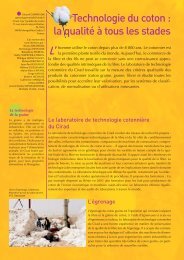VIP N.3 [GB]-->WEB - Cirad
VIP N.3 [GB]-->WEB - Cirad
VIP N.3 [GB]-->WEB - Cirad
Create successful ePaper yourself
Turn your PDF publications into a flip-book with our unique Google optimized e-Paper software.
CIRAD<br />
VI<br />
PINNOVATION<br />
ALORISATION<br />
&<br />
en PARTENARIAT<br />
No 3<br />
April 2005<br />
Editorial<br />
CIRAD’s research teams are<br />
currently adopting an integrated<br />
approach to developing quality<br />
tropical foods, aimed at helping<br />
the agrifood industry to innovate<br />
and agricultural producers to find<br />
new markets. Our work is guided<br />
by local knowledge and consumer<br />
demand, and we work with the various<br />
players in each commodity chain to<br />
boost the agroindustrial sector in developing<br />
countries.<br />
The main objectives of our research in this<br />
field are to make optimum use of biodiversity,<br />
cut postharvest losses, reduce chemical<br />
use for storage purposes and preserve<br />
the nutritional and sensorial properties of<br />
fruits during processing. Numerous results<br />
have already been obtained and applied by<br />
our partners in various countries: raw material<br />
diversity characterization; development<br />
of gentle stabilization, formulation and processing<br />
technologies; alternatives to pesticides<br />
for postharvest use; and food risk<br />
prevention and integrated management<br />
methods.<br />
This type of partnership is crucial in determining<br />
the research to be undertaken so<br />
as to solve the practical problems faced<br />
by tropical fruit producers, processors and<br />
consumers. Do not hesitate to get in<br />
touch if you would like to work with<br />
us on these issues: maybe we can<br />
break new ground together.<br />
CIRAD and the aid operation in Asia after the tsunami<br />
CIRAD has offered its services to the French government in the following ways: ❐ post-emergency<br />
operations, helping NGOs and the authorities use the most appropriate modern techniques<br />
to help affected families return to work; ❐ rehabilitation and forward planning, to<br />
encourage development and local land use management geared towards boosting the<br />
resilience of cultivated coastal ecosystems and the organizational capacity of the people<br />
who live there. This second operation will involve research centres and universities<br />
in the affected countries, as well as the French research centres CIRAD, IRD and<br />
IFREMER.<br />
Contact: alain.leplaideur@cirad.fr<br />
CIRAD at the Paris International Agricultural Fair<br />
CIRAD had a stand at the Paris International Agricultural Fair, from 26 February<br />
to 6 March, on the topic “Family agriculture and the future”. 2005 is the Year<br />
of Brazil in France, and the Fair provided the opportunity to promote CIRAD’s<br />
work on this issue with EMBRAPA, a Brazilian agricultural research organization,<br />
over the past 20 years or more.<br />
Contact: anne.hebert@cirad.fr<br />
The fruit and vegetable market observation service<br />
The CIRAD market observation service, which conducts economic studies<br />
and assists fresh and processed fruit and vegetable market operators, has<br />
considerable experience in the European and international market places.<br />
This service is backed up by the journal FruiTrop and by regular market<br />
analyses (banana, orange, avocado, etc).<br />
For more details, see http://passionfruit.cirad.fr/site_anglais/index_e.html.<br />
Contact: denis.loeillet@cirad.fr<br />
A citrus breeding project<br />
With partners from the Mediterranean Basin, CIRAD has been granted EU<br />
funding for an operation aimed at breeding citrus rootstocks that can withstand<br />
the severe constraints in the region. The project centres on tolerance<br />
of salt stress and ferric chlorosis associated with calcareous soils. Two<br />
Mediterranean networks are to be set up to manage rootstock collections and<br />
multi-site trials of new varieties.<br />
Contact: patrick.ollitrault@cirad.fr<br />
A project to promote under-used tropical fruits<br />
Véronique Vissac-Charles<br />
CIRAD Technology Transfer and<br />
Development Coordinator<br />
Along with European and South American partners, CIRAD has just been granted EU<br />
funding to promote the Andes berry, tree tomato, pitahaya, prickly pear, naranjillo, cabbage<br />
palm, camu-camu, cashew apple and peach palm. These fruits are of vital economic<br />
importance for rural populations in South America. The project should help<br />
develop fruit species biodiversity in the humid tropical zones of South America.<br />
Contact: fabrice.vaillant@cirad.fr<br />
ISSUE<br />
TROPICAL FRUITS
Science<br />
◗ CUTTING PESTICIDE USE IN FRUIT STORAGE<br />
The lactoperoxidase system (LPS) is commonly used to store unpasteurized milk. The<br />
enzyme lactoperoxidase, which is found naturally in milk, destroys a large proportion<br />
of the bacteria in milk, and appears to be equally effective in the case of whole fruits and vegetables. By reducing the need<br />
for postharvest anti-bacterial and anti-fungal treatments, the LPS also considerably reduces health risks for consumers.<br />
CIRAD has tested the LPS on pathogens affecting bananas, which use a lot of pesticides. The trials were conducted in<br />
conjunction with the TMI company, which produces Eau Activée ® , an industrial version of the LPS. The first results obtained<br />
in Guadeloupe look promising. They are currently being validated under industrial conditions in Cameroon. The system is<br />
also due to be tested on mangoes, pineapples and yams. ■<br />
SCIENTIFIC CONTACT: marie-noelle.ducamp-collin@cirad.fr<br />
COMMERCIAL CONTACT: remy.hugon@cirad.fr<br />
the impact of drying, cooking,<br />
formulation and texturization<br />
operations on nutritionally<br />
valuable constituents<br />
◗ PLANTAIN FRYING PROCESS<br />
The frying process can be used to dry, cook, formulate or texturize<br />
products, and there are ever-increasing volumes of fried foods<br />
on the market. Demand is growing in the industrialized world for<br />
these products to be characterized in nutritional terms: promoting<br />
the fact that they contain worthwhile constituents or, on the contrary,<br />
minimizing the occurrence of possibly harmful compounds.<br />
CIRAD is working with IRD, the Institut de recherche pour le<br />
développement and ENSIA, the Ecole nationale supérieure des<br />
industries agricoles et agroalimentaires<br />
to develop plantain frying<br />
methods and investigate the impact<br />
of drying, cooking, formulation<br />
and texturization operations on<br />
nutritionally valuable constituents.<br />
Indeed, these constituents may be either removed (water-soluble<br />
vitamins, minerals, etc) or transformed and denatured (vitamins,<br />
carotenoids, etc) by frying, while toxic compounds (polyacrylamides,<br />
free fatty acids, etc) may be generated. Recommendations<br />
are to be made with a view to guaranteeing the nutritional<br />
properties of such products while conserving the organoleptic<br />
characteristics most appreciated by consumers, in developing<br />
countries. ■<br />
SCIENTIFIC CONTACT: philippe.bohuon@cirad.fr<br />
COMMERCIAL CONTACT: alain.bergeret@cirad.fr<br />
◗ LOW-TEMPERATURE FRUIT JUICE CONCENTRATION<br />
Concentrating fruit juice reduces its water content by 90%,<br />
cutting transport and storage costs. However, heat evaporation,<br />
the conventional industrial technique, modifies the nutritional and<br />
sensorial qualities of fruit juice, since it causes thermal degradation<br />
and aromatic compound losses.<br />
CIRAD is primarily working with the<br />
Institut européen des membranes, in<br />
France, and national research bodies in<br />
Brazil and Costa Rica, to develop a new<br />
cold-concentration process: osmotic evaporation. The challenge<br />
is to offer manufacturers a simple concentration technology that<br />
safeguards the intrinsic quality of the fruits. Under semi-industrial<br />
conditions, the membrane technique produces concentrates at 65°<br />
Brix, whose vitamin content and organoleptic quality are similar<br />
to those of fresh juice. The process has been patented, and an industrial<br />
transfer is under study. ■<br />
SCIENTIFIC CONTACT: manuel.dornier@cirad.fr<br />
COMMERCIAL CONTACT: jean-paul.meyer@cirad.fr<br />
a simple concentration<br />
technology that safeguards<br />
the intrinsic quality<br />
of the fruits<br />
Market<br />
the lactoperoxidase system considerably<br />
reduces health risks for consumers<br />
ISSUE<br />
TROPICAL FRUITS<br />
◗ AMBARELLA JUICE QUALITY<br />
Green ambarella-based drinks are very popular among consumers<br />
in the French West Indies, by virtue of their sharp,<br />
slightly astringent taste and green colour. They are one of<br />
the leading products sold by Société nouvelle des yaourts<br />
Littée (SNYL), a firm in Martinique that has a major share<br />
of the French West Indian fruit juice market. However, they<br />
do have some disadvantages: a variable starch content,<br />
cold sedimentation of the starch they contain, alteration of<br />
the initial greenish-yellow colour of the fruit, etc.<br />
In conjunction with SNYL and the University of<br />
Guadeloupe, CIRAD decided to<br />
test enzymatic treatment of crushed<br />
fruits, to break down the cell walls<br />
and the starch in the ambarella<br />
to produce pure juices<br />
without added sugar,<br />
and preserve fruit colour<br />
fruits and thus improve juice quality. These treatments<br />
should make it possible to standardize starch levels in the<br />
end product, produce pure juices without added sugar, and<br />
preserve fruit colour. The results obtained in the laboratory<br />
are due to be tested on an industrial scale in Martinique<br />
in 2005. ■<br />
SCIENTIFIC CONTACT: severine.franquin@cirad.fr,<br />
jean-marc.brillouet@cirad.fr<br />
COMMERCIAL CONTACT: jean-paul.meyer@cirad.fr
◗ FRESH FRUIT PACKING<br />
Tropical fruits are fragile. Moreover, they are highly vulnerable to shock and diseases during export. Their postharvest shelf<br />
life therefore needs to be improved in order to maintain quality.<br />
CIRAD is studying ways of modifying the atmosphere around the fruits, so as to slow the<br />
ripening process, using suitably permeable film. A modified atmosphere is achieved by balancing<br />
fruit respiration intensity and packing film permeability. For instance, lychees in particular<br />
very rapidly lose their red colouring once harvested, which is a considerable marketing handicap, and shipping<br />
them by air, in film-wrapped trays, has given good results. These results have been validated under commercial conditions<br />
by Compagnie Franco Suisse and Colis pays de la Réunion. Applications based on the same principle but wrapping the<br />
fruits directly are currently being tested on mangoes. ■<br />
SCIENTIFIC CONTACT: marie-noelle.ducamp-collin@cirad.fr<br />
COMMERCIAL CONTACT: jean-paul.meyer@cirad.fr<br />
Technology<br />
to slow the ripening process,<br />
using suitably permeable film<br />
◗ AROMA QUALITY OF ALCOHOLIC<br />
DRINKS<br />
The fruit-based alcoholic drinks sector has been<br />
booming in recent years. L&L, based in Agen,<br />
France, is a market leader, specializing in passionfruit<br />
and cognac-based cocktails (“Alizée”<br />
cocktail), and exports most of what it produces.<br />
The firm is keen to guarantee consistent product<br />
quality, and asked CIRAD to work on this aspect,<br />
based on its experience of aromatic characterization<br />
of fruit juices. The aroma quality of passionfruit<br />
concentrates was analysed with a view to standardizing<br />
end product quality. The study<br />
enabled not only product quality<br />
control, but also the identification of<br />
several lots that did not satisfy the relevant<br />
quality criteria. ■<br />
SCIENTIFIC CONTACT: pierre.brat@cirad.fr<br />
COMMERCIAL CONTACT: jean-paul.meyer@cirad.fr<br />
to study the interactions<br />
between aroma, packaging<br />
and the food matrix<br />
Fried banana seller, Thailand.<br />
© <strong>Cirad</strong>, G. Trébuil<br />
◗ REDUCING AROMA LOSSES IN ORANGE JUICE<br />
Packing orange juice in polyethylene teraphthalate (PET) bottles modifies<br />
the aroma balance and causes overall degradation of the juice,<br />
as PET is oxygen-permeable. This results in browning, a gradual<br />
change in the aroma profile and a drop in vitamin C content.<br />
Délifruits, a French firm specializing in aseptic cold-packing of<br />
fruit juices in plastic containers, called upon CIRAD (in partnership<br />
with ENSIA and INRA, the Institut<br />
national de la recherche agronomique)<br />
to study the interactions between aroma,<br />
packaging and the food matrix with a<br />
view to improving the quality of juice packed in this type of<br />
container. The results should enable a rational choice of the type<br />
of PET container (single or multi-layer, internally coated, etc),<br />
depending on the quality and type of juice to be packed. ■<br />
SCIENTIFIC CONTACT: pierre.brat@cirad.fr<br />
COMMERCIAL CONTACT: jean-paul.meyer@cirad.fr<br />
the aroma quality of passionfruit<br />
concentrates was analysed<br />
with a view to standardizing end<br />
product quality<br />
◗ FRUIT CHIP PRODUCTION<br />
Conventional frying techniques for making chips are only<br />
suitable for products with a low moisture and reducing<br />
sugar content and with high starch content, such as green<br />
plantains or potatoes. Products with a high moisture content<br />
have to be fried for a long time to ensure a crunchy<br />
texture, and reducing sugars cause excessive browning.<br />
CIRAD has developed a new process with a view to<br />
using the technique for fleshy fruits and vegetables: ripe<br />
fruit pieces are pre-dehydrated in an osmotic solution<br />
containing either salt or sugar, and then flash-fried. It can<br />
be used to make banana, pineapple or<br />
kiwi chips with a low fat content, attractive<br />
colour, crunchy texture and strong<br />
fruity taste. The process has been<br />
patented.<br />
The process is currently being used by Caminos del<br />
a low fat content,<br />
attractive colour,<br />
crunchy texture<br />
Sol in Costa Rica. Industrial application is under way in<br />
New Caledonia and Vietnam. ■<br />
SCIENTIFIC CONTACT: fabrice.vaillant@cirad.fr<br />
COMMERCIAL CONTACT: jean-paul.meyer@cirad.fr<br />
◗ MICROWAVE TREATMENT OF DATES<br />
TO CONTROL INSECTS<br />
Date exporting countries generally fumigate dates destined<br />
for Europe with methyl bromide. However, this gas<br />
is toxic to both humans and the environment, and was<br />
banned in Europe this year.<br />
CIRAD has developed a<br />
this kills date pyralid eggs<br />
and larvae, without leaving<br />
any phytosanitary product<br />
residues<br />
replacement heat treatment,<br />
microwaving the dates for<br />
3 minutes at 65°C. This kills<br />
date pyralid eggs and larvae,<br />
without leaving any phytosanitary<br />
product residues. The process has been<br />
patented, and CIRAD is now in talks with several<br />
European equipment manufacturers with a view to its<br />
development. ■<br />
SCIENTIFIC CONTACT: max.reynes@cirad.fr<br />
COMMERCIAL CONTACT: jean-paul.meyer@cirad.fr
SIMACO<br />
CIRAD and SIMACO have been working<br />
for over 20 years developing tropical fruit<br />
juice production lines, which are now<br />
sold in numerous developing countries.<br />
INTERVIEW with M. Heusser,<br />
CEO of SIMACO.<br />
What does SIMACO do?<br />
The Société industrielle de matériel de conservation,<br />
SIMACO, specializes in smallscale<br />
fruit juice production equipment:<br />
pressing, pasteurization, bottling, etc. This<br />
equipment has traditionally been used for<br />
temperate fruits, but we have worked with<br />
CIRAD to adapt it to tropical fruits and tropical<br />
conditions.<br />
How did you hear of CIRAD?<br />
We were chosen under an operation<br />
launched by ENSIA to identify companies<br />
capable of supplying<br />
simple equipment for<br />
use in tropical countries.<br />
We took part in<br />
an ENSIA forum at<br />
the 1985 Paris International<br />
Agricultural<br />
Fair, which aroused<br />
considerable interest.<br />
That was where I met<br />
Mr Estanove and<br />
Mr Duverneuil from<br />
IRFA, which is now<br />
the CIRAD Fruit and<br />
Horticultural Crops<br />
Department (CIRAD-<br />
FLHOR).<br />
Why did you choose CIRAD?<br />
It was all a matter of experience: Mr Estanove<br />
had already worked on maracuja<br />
juice production in Guadeloupe and<br />
Mr Duverneuil knew an entrepreneur in<br />
Burundi who was keen to increase his fruit<br />
juice output. We signed a contract:<br />
SIMACO was to adapt its fruit juice production<br />
line to the conditions in Burundi,<br />
provided IRFA ensured that it worked correctly.<br />
With financial support from ANVAR<br />
(Agence française de la valorisation), we<br />
launched passion fruit juice production<br />
operations at Bujumbura in 1987.<br />
© SIMACO<br />
<strong>VIP</strong><br />
the Technology Transfer and<br />
Development Newsletter<br />
CIRAD<br />
Partner<br />
SIMACO at a glance<br />
Nationality: French<br />
Status: limited company<br />
Founded: 1983<br />
Staff: 5 full-time and 3 part-time<br />
Turnover: 460 000 euros in 2004<br />
Field: fruit juice production equipment<br />
You sell equipment all over the world. How<br />
did you find your customers?<br />
Word rapidly spread about this first smallscale<br />
passion fruit production unit, and we<br />
were flooded with similar requests! CIRAD<br />
helped us pinpoint the most feasible ones,<br />
and since then, we have sold more than<br />
30 maracuja, citrus, pineapple, guava<br />
and custard apple juice production lines<br />
to Cameroon, Burkina Faso, Mali, Madagascar,<br />
Mauritius, Ghana, Congo, Cuba<br />
and even China.<br />
What are the results of<br />
your work with CIRAD?<br />
Above all, we have benefited<br />
from CIRAD’s<br />
experience in the field,<br />
in terms of customers<br />
and of the type of equipment<br />
required: 80% of<br />
our exports are to Africa.<br />
CIRAD has started up<br />
each new installation<br />
and developed products<br />
tailored to the target<br />
market, with financial<br />
support from the EC<br />
Centre for the Development<br />
of Enterprise. A<br />
SIMACO line has been<br />
installed in the CIRAD technology centre<br />
in Montpellier for training purposes.<br />
Do you have plans for any new projects?<br />
We would like to adapt the equipment to<br />
other fruits (pomegranate) and develop<br />
processes using Flash détente®, to be integrated<br />
into a complete high quality juice<br />
or puree production line. We are also<br />
looking at new types of packaging: polyethylene<br />
terephthalate, bag in box, etc.<br />
CONTACTS: simaco@wanadoo.fr<br />
max.reynes@cirad.fr<br />
Editor: Alain Weil, Director of Innovation and Communication<br />
Coordination: Technology Transfer and Development Office<br />
Editorial Committee: CIRAD network of Technology Transfer<br />
and Development Coordinators<br />
CIRAD, Direction de l’innovation et de la communication,<br />
Délégation valorisation, avenue Agropolis, TA 173/04<br />
34398 Montpellier Cedex 5, France<br />
Tel: +33 4 67 61 57 72 • Fax: +33 4 67 61 75 37<br />
For further information: www.cirad.fr<br />
To receive CIRAD <strong>VIP</strong> free of charge by e-mail,<br />
please register at vip-cirad@cirad.fr<br />
Place<br />
Martinique<br />
CIRAD’s research<br />
Rivière<br />
Lézarde<br />
operations have been<br />
stren<strong>gt</strong>hened by the<br />
setting up of the<br />
Fort-de-France<br />
Petit<br />
Martinique agricultural<br />
research<br />
Morne<br />
centre (PRAM).<br />
The centre involves<br />
human and technical resources from<br />
CIRAD, CEMAGREF, INRA and IRD. It aims<br />
to design modern, diversified, sustainable<br />
and reproducible ecofriendly farming systems<br />
that guarantee a satisfactory income<br />
for farmers.<br />
CIRAD IN MARTINIQUE<br />
PRAM has a staff of almost 100, including<br />
20 researchers (12 from CIRAD), 20 technicians,<br />
10 graduate students, and other students.<br />
It has very advanced scientific<br />
equipment, which has been updated with<br />
a view to certification. CIRAD is working<br />
with its Caribbean research and development<br />
partners on:<br />
–banana: improving product competitiveness<br />
and quality, reducing environmental<br />
impact, broadening the range of<br />
varieties;<br />
–pineapple: optimizing crop management<br />
sequences, marketing a new ecofriendly<br />
pineapple variety, supporting the commodity<br />
chain;<br />
–fruit trees: citrus fruit growing, diversifying<br />
and domesticating fruit tree varieties, integrated<br />
fruit production, elite planting material;<br />
–market gardening: controlling production<br />
by growing sheltered crops, rational pest<br />
control, broadening the range of varieties.<br />
Diversification—new species and varieties,<br />
innovative techniques—has a crucial role<br />
to play in sustainable agricultural development<br />
in Martinique.<br />
CONTACT: thierry.goguey-muethon@cirad.fr<br />
SPECIFIC EXPERTISE IN FRUIT QUALITY<br />
Researchers are working to understand the<br />
mechanisms behind banana and pineapple<br />
quality. The sensorial characteristics of new<br />
varieties are being assessed, along with cold<br />
storage techniques with a view to exporting<br />
pineapples. CIRAD is helping its partners<br />
establish a project to characterize traditional<br />
bananas in Martinique, based on the<br />
production site. A “mountain banana” label<br />
and a “Martinique banana” protected geographical<br />
indication are also under study.<br />
CONTACT: christophe.bugaud@cirad.fr


![VIP N.3 [GB]-->WEB - Cirad](https://img.yumpu.com/26838098/1/500x640/vip-n3-gb-ampgtweb-cirad.jpg)
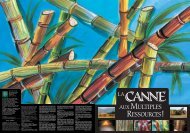

![Version française [pdf, 376,65 ko] - Cirad](https://img.yumpu.com/26838166/1/184x260/version-franaaise-pdf-37665-ko-cirad.jpg?quality=85)
![VIP N°4 [FR] - Cirad](https://img.yumpu.com/26838163/1/184x260/vip-na4-fr-cirad.jpg?quality=85)
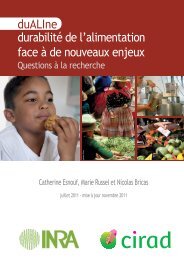
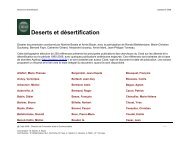
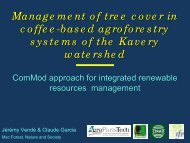
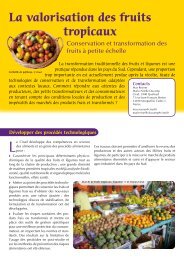

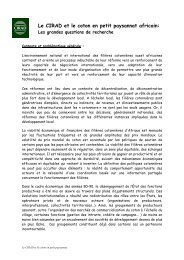
![VIP N.4 [ESP]--> PDF - Cirad](https://img.yumpu.com/26838123/1/184x260/vip-n4-esp-pdf-cirad.jpg?quality=85)
![Version française [pdf, 493,34 ko] - Cirad](https://img.yumpu.com/26838117/1/184x260/version-franaaise-pdf-49334-ko-cirad.jpg?quality=85)
![Version française [pdf, 180,31 ko] - Cirad](https://img.yumpu.com/26838111/1/184x260/version-franaaise-pdf-18031-ko-cirad.jpg?quality=85)
